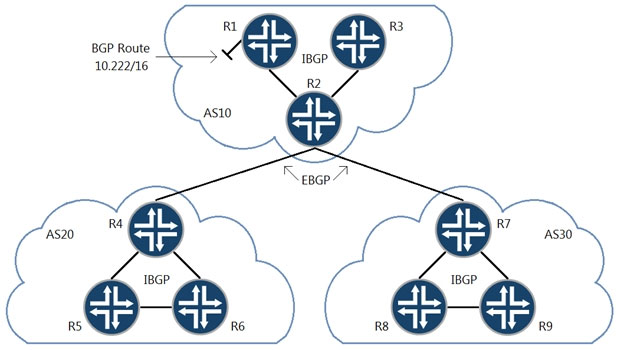
Referring to the exhibit, which three statements about route 10.222/16 are correct when using the default BGP advertisement rules? (Choose three)

Referring to the exhibit, which three statements about route 10.222/16 are correct when using the default BGP advertisement rules? (Choose three)
R2 will prepend AS10 when advertising the route 10.222/16 to R7 because adjacent ASes are typically advertised the AS path. R2 will advertise route 10.222/16 to R4 with itself as the next hop, as this is standard behavior for EBGP peering; the next hop is set to the sending router. Similarly, R7 will advertise 10.222/16 to R9 with itself as the next hop, following the same EBGP standard behavior.
I consider B,C,D
The ans is B, C, D By default, IBGP will not change the next hop. D is correct since the route is from external EBGP. https://kb.juniper.net/InfoCenter/index?page=content&id=KB34964&cat=BGP&actp=LIST
That route is not from EBGP.
BCE correct as Q is about default BGP advertisement
Only see 2 answers: B+C A is not performed (will be AS loop condition at R2 if done by default) B is correct. C is correct (next hop is its interface address of R2) D is not correct (requires NHS policy; not default) E is not correct (requires NHS policy; not default) Only assumptions can make, NHS done at iBGP peers for the EBGP routes and route received at R1 are IBGP. Answer then is B+C+E.
A incorrect: it's IBGP, so AS PATH stays the same - () B correct: default EBGP behaviour. C correct: default EBGP behaviour. Another AS doesn't need to know about our AS internals, so border router change next hop to itself. D correct: default behaviour. See Ivan Pepelnjak's article in the link below. E incorrect: next hop doesn't change on IBGP sessions. That's why we need "next-hop self" policies. https://blog.ipspace.net/2011/08/bgp-next-hop-processing.html
CDE as R1 would not prepend an iBGP route and R2 would advertise this without prepending making A&B not viable answers. We know iBGP can not replace routes with next hop self so wouldn't consider D at first glance but with the route originating from R1 it would in fact be the next hop.
I think A, C, D are correct. When R1 advertises route 10.222/16 to R2 it will send AS-path of [10] i. So I think R1 is the first node that adds AS 10 to AS-path, not R2.
D and E are wrong, so that leaves ABC. R7 does not chance nexthop to itself without a policy or next hop self command. iBGP does not change next hop
BCD, A is incorrect as it looks like the route is imported by R1 the path is i D is incorrect as the next-hop is R2
BCD are correct
B and C are obviously correct, don't need explanation anymore. Answe D is also correct and the explanation is the following: When a router originates a BGP route configured with a network router configuration command or through route redistribution (redistribute router configuration command), it sets the BGP next hop to the IGP next hop.